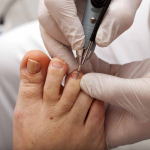Plantar Fasciitis/Heel Spur
Plantar fasciitis is a relatively common condition and is the most common cause of heel pain. Plantar Fasciitis is an inflammation caused by excessive stretching of the plantar fascia. The plantar fascia is a flat band of tissue which runs along the bottom surface of the foot, connecting your heel bone to the toes. It supports the arch of the foot. When the plantar fascia is excessively stretched, this can cause plantar fasciitis, which can also lead to heel pain, arch pain, and heel spurs.
Plantar fasciitis is caused by straining the ligament that supports your arch. Repeated strain can cause tiny tears in the ligament. The excessive stretching on the plantar fascia leads to inflammation and discomfort and can be caused by the following:
- Over Pronation (flat feet) – collapsed arch
- High arch foot
- Overweight – obesity and pregnancy
- A sudden change in physical activity
- Poor footwear
- Tight calf muscles/achilles tendon
Most people with plantar fasciitis have pain when they take their first steps after they get out of bed or sit for a long time, because while resting the plantar fascia contracts back to its original shape. You may have less stiffness and pain after you take a few steps. But your foot may hurt more as the day goes on.
Treatment
There are many methods you can try to relieve the heel pain of plantar fasciitis. Treatment of plantar fasciitis will depend on what is causing the strain and excessive stretching of the plantar fascia.
-
-
- Strapping the foot to provide support
-
-
-
- Supportive Footwear with good shock absorption
-
-
-
- Rest from physical activities
-
-
-
- Calf stretching and massaging with a tennis ball
-
-
-
- Orthotic therapy – customised orthotic insoles
-
-
-
- Dry needling
-
- Foot manipulation
-
Plantar fasciitis is a treatable condition, you don’t need to suffer. Proper footwear together with orthotics can help to treat and prevent plantar fasciitis in the future. It is strongly recommended that you see your podiatrist to get a definite diagnosis before attempting any therapy on your own.





